Peptides have gained considerable attention in recent years, especially within the health and fitness communities. As chains of amino acids, peptides are vital for various biological functions and play a crucial role in muscle growth, fat loss, and overall health. This article delves into the *results* associated with peptide use, factors influencing their effectiveness, and considerations for those looking to incorporate them into their regimen.
What Are Peptides?
Peptides are short sequences of amino acids that are linked together by peptide bonds. They can be naturally occurring or artificially synthesized and serve a multitude of functions in the human body. Peptides act as signaling molecules, helping to regulate various bodily functions such as:
– Hormone production
– Immune response
– Tissue repair
– Muscle growth
Due to their important biological roles, peptides have become popular in therapeutic and performance-enhancing contexts.
Types of Peptides and Their Functions
There are numerous types of peptides, each serving specific functions. Some of the most widely used peptides include:
1. **Growth Hormone-Releasing Peptides (GHRPs):**
– Stimulate the secretion of growth hormone from the pituitary gland.
– Commonly used for muscle gain and fat loss.
2. **Insulin-like Growth Factor (IGF-1):**
– Promotes cell growth and development.
– Important for muscle recovery and regeneration.
3. **Collagen Peptides:**
– Support skin, joint, and bone health.
– Help improve elasticity and hydration in the skin.
4. **Melanotan:**
– Increases melanin production for enhanced skin tanning.
– Used for cosmetic purposes.
5. **CJC-1295:**
– A growth hormone secretagogue that increases growth hormone levels.
– Often used for anti-aging and muscle-building purposes.
Each type of peptide yields different outcomes depending on its specific function and application.
The Results of Using Peptides
The results derived from peptide use can vary significantly based on several factors, including the type of peptide, dosage, duration of use, and individual responses. Here are some common results associated with peptide supplementation:
Muscle Growth:
Many athletes and bodybuilders utilize peptides to enhance muscle hypertrophy. GHRPs and IGF-1, for instance, have shown promise in increasing muscle mass when combined with resistance training.
Fat Loss:
Certain peptides can stimulate fat oxidation and decrease appetite, leading to effective weight loss. The combination of muscle gain and fat reduction is often desired among fitness enthusiasts.
Improved Recovery:
Peptides like BPC-157 can aid in healing injuries and reducing recovery time post-exercise. This makes them appealing to athletes who want to maximize their performance while minimizing downtime.
Enhanced Skin Health:
Collagen peptides have been linked to improved skin elasticity and reduced signs of aging. Users often report smoother skin texture and better joint mobility.
When it comes to peptide results, it’s crucial to ensure that you’re using a reliable and high-quality product. One such product that has been proven to deliver excellent results is the Peptide original. This product is known for its effectiveness and safety, making it a top choice for many individuals looking to improve their health and fitness levels.

Factors Affecting Peptide Results
To achieve optimal results with peptides, several key factors must be considered:
1. **Quality of the Product:**
– Ensure you source peptides from reputable suppliers to avoid contaminated or substandard products.
2. **Dosage:**
– Following recommended dosages is essential to maximize benefits while minimizing potential side effects.
3. **Individual Physiology:**
– Genetic factors, age, sex, and overall health can influence how an individual responds to peptide supplementation.
4. **Diet and Exercise:**
– A well-rounded diet and consistent exercise routine will complement peptide use, enhancing overall results.
5. **Duration of Use:**
– Longer usage may lead to more significant results; however, cycling peptides can prevent desensitization.
Potential Side Effects
While peptides are generally considered safer than anabolic steroids, they are not without potential side effects. Users should be aware of possible reactions, which may include:
– Injection site reactions (pain, redness)
– Headaches
– Nausea
– Hormonal imbalances if misused
To minimize risks, individuals should consult healthcare professionals before beginning any peptide regimen.
Conclusion
The results associated with peptide use can be significant for those looking to boost their fitness and health. With various types of peptides offering unique benefits, individuals can tailor their approach according to personal goals. However, prioritizing product quality, understanding dosing, and maintaining a healthy lifestyle are critical components of achieving the best possible outcomes.
By carefully considering these factors and being informed about the nature of peptide therapy, individuals can optimize their experiences and results, leading to enhanced performance and overall well-being..



